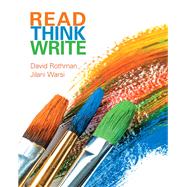For intermediate-level courses in Integrated Reading and Writing.
A meaningful, content-driven approach to integrated reading and writing proficiency Read Think Write: True Integration Through Academic Content helps students develop the skills they need to succeed in all subsequent discipline-specific courses.
The authors start with an introduction to the reading, thinking, and writing processes and a detailed discussion of how students can get the most out of the text. Subsequent chapters are organized thematically, each covering an academic content area. This builds students’ academic vocabulary and enables them to develop and pursue academic interests.
Each discipline chapter ends with an essay assignment that asks students to integrate skills they’ve learned in the chapter and ideas from the other chapter readings. Students apply these skills by reading actively, thinking about and evaluating text, identifying the topics, main ideas, and details, making inferences, and recognizing key patterns of organization and translating these reading skills into their writing equivalents to write thoughtful, effective essays.
Also available with MySkillsLab®
MySkillsLab is an online homework, tutorial, and assessment program designed to engage students and improve results. Within its structured environment, students practice what they learn, test their understanding, and pursue a personalized study plan that helps them better absorb course material and understand difficult concepts.
Note: You are purchasing a standalone product; MySkillsLab does not come packaged with this content. Students, if interested in purchasing this title with MySkillsLab, ask your instructor for the correct package ISBN and Course ID. Instructors, contact your Pearson representative for more information.
If you would like to purchase both the physical text and My##Lab, search for:
013407257X / 9780134072579 Read Think Write: True Integration Through Academic Content Plus MySkillsLab – Access Card Package
Package consists of:
- 0134096649 / 9780134096643 Read Think Write: True Integration Through Academic Content
- 0133931242 / 9780133931242 MySkillsLab without Pearson eText – Inside Star Sticker
- 0133931285 / 9780133931280 MySkillsLab without Pearson eText – Access Card








